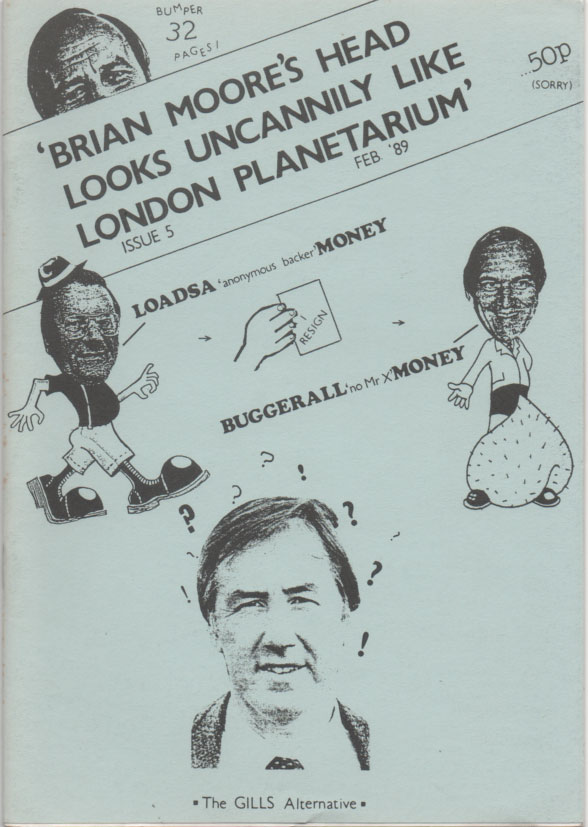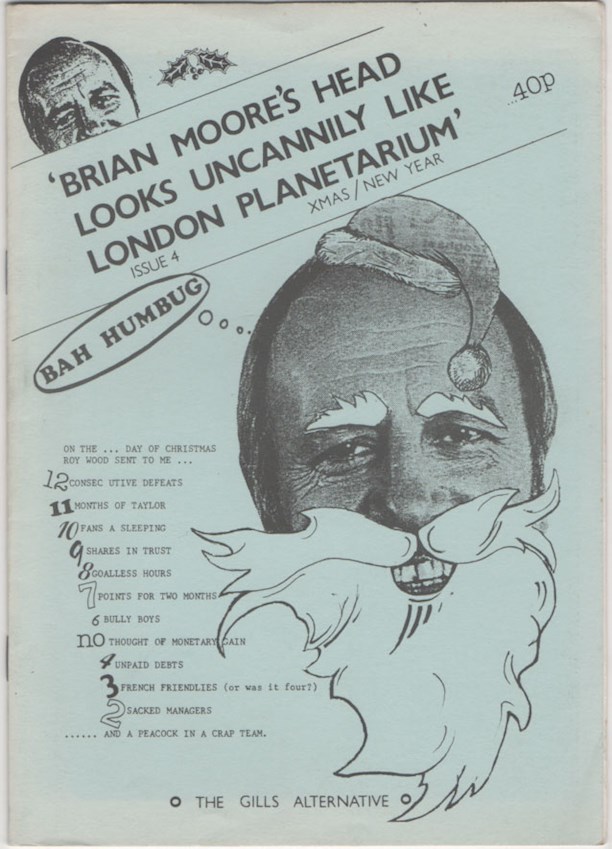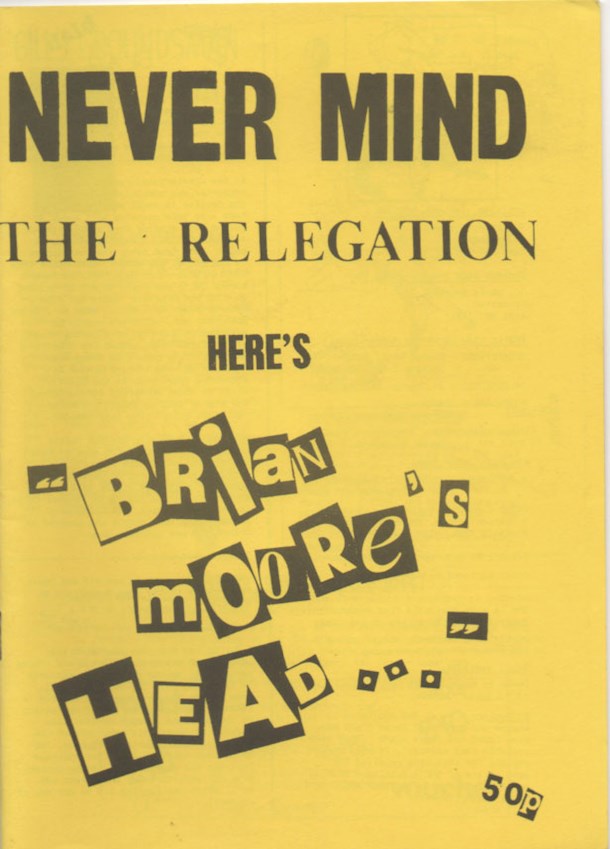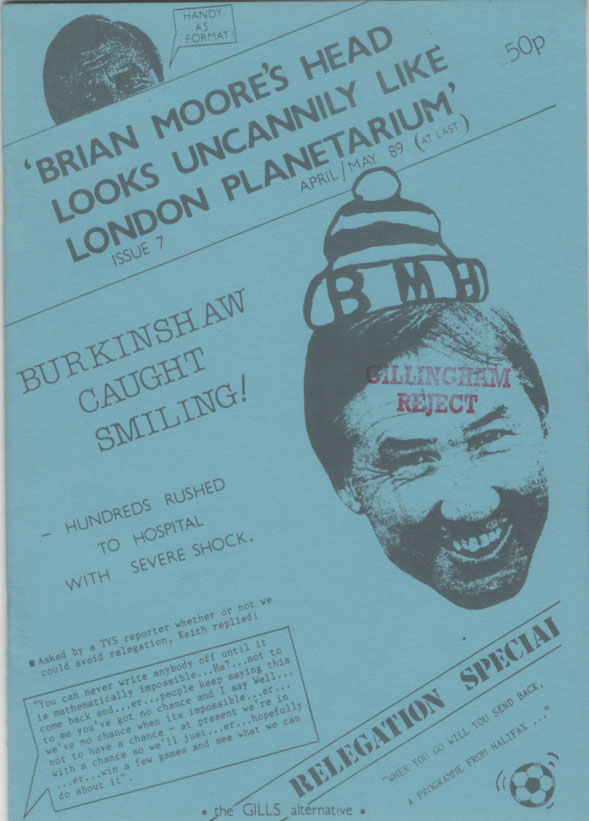Four more issues of Brian Moore’s Head were published during the remainder of the 1988-9 season.
The editorial of the Christmas / New Year edition dished out some festive praise to some people that the fanzine hadn’t previously been too enamoured with, ‘You will have noted that in past issues we have not been slow to criticise the club’s directors, so it is only fair to applaud them when they do something right. And the appointment of Keith Burkinshaw was right. So, it’s over to you now Keith, let’s have a winning team.’
In what were pre-Sky days, Simon Chaplin was not impressed with ITV, who had signed an exclusive deal for rights to all league football for the next four seasons and were showing the odd game live. It was also pre-Premiership, so league football also included the top flight. Both ITV and BBC argued at the time that football highlights programmes had suffered decreasing viewing figures, leading to the conclusion that viewers no longer wanted them.
Simon disagreed, citing the lower figures as being down to viewers not knowing when programmes were on, mentioning one particular occasion when highlights in our region were shown at 9.25 on a Sunday morning. The programmes were also shown on a very infrequent basis. Chaplin posed the question, ‘Are ITV giving their customers, the viewers, what they want? I think not.’ He wanted to see ‘a return to the old format, with the only live games being reserved for Cup Finals and important internationals. But it now looks like nothing will change until the ITV deal has run its course and, unless the ITV Head of Sport realises the error of his ways, TV soccer will continue with the occasional live game that people will gradually become bored with, leading to the viewing figures decreasing and, in turn, leading to the end of TV soccer coverage.’
Issue five of BMH saw an increase in size from 24 to 32 pages, with the price also up from 40p to 50p. Roy Wood had resigned as Gillingham chairman, a move that had caught the fanzine team on the hop, with a planned editorial that would have suggested that Wood had earned the right to be chairman.
Instead, the piece looked back at Wood’s time at the helm, ‘His reign has seen Gills plunge further into the financial mire, a once entertaining and winning team has been transformed into possibly the worst side in the division. We have seen our best players sold, sometimes at knockdown prices, a talented manager undeservedly sacked, and their replacements have been vastly inferior in almost every case.

New chairman Martin Lukehurst’s opening salvo doesn’t offer much comfort. Despite the fact that we have been told that there was a mystery backer waiting in the wings, who was going to inject £1M into the club, Lukehurst stated, “I have to say that there is no Elton John waiting around the corner ready to put money into the club, there is no Mr X waiting to join the board”. It is also rumoured that the club’s debt has now risen to the region of £1.2M. We are entitled to ask just what the hell has been going on. Since the death of [former chairman] Dr Grossmark, successive Gillingham boards have been guilty of gross mis-management, to a point where we are now staring an extended spell in Division Four in the face. There appears to be little hope of cash being made available for new players. When you take all these factors into account, the future looks bleak.’
One writer in the same edition complained about the decision to sell Trevor Quow to Northampton, which was apparently ‘absolutely astounding’, as was manager Burkinshaw’s subsequent statement that he had no immediate plans to sign a replacement. The question was asked as to why the boss hadn’t strengthened the squad, with two possible answers provided, ‘1.
The money has not been available’ or ‘2. He is an idiot.’ It has since been reported that, when asked how much would be needed to be spent on the squad to keep the Gills in Division Three, the manager replied that he would require £300,000. The article concluded with, ‘We must make signings now, delay much longer and it will be too late. If the money is not being made available then we have been conned, funds for new players have been promised time and time again and have not been forthcoming. Empty promises are no good to anyone. This club does not belong in the Fourth Division, but it’ll take more than a bit of juggling with the current squad to avoid it.’
The author of the ‘Worst XI’ made his selection using a huge dose of irony, stating that his side was made up of players who were not good enough to keep their place in the Gillingham team and were forced to leave, never to be heard of again. These included; Micky Adams, Steve Bruce, Tony Cascarino and Peter Beardsley. A variation on a theme was provided by the ‘Sent Off XI’, a line-up that included BMH favourite Graham Pearce, who saw red because he ‘dismantled Darren Beckford’s face with a stray elbow, whilst chasing a through ball’ and Jeff Johnson, who, having been hacked from behind in a game against Rotherham, ‘got up and thumped the nearest player.’ The poleaxed opponent hadn’t been the perpetrator of the original foul, but also received his marching orders.
One article looked back at the pre-Christmas visit to Northampton, to their old County Ground home that they shared with the county cricket club, not the far superior Sixfields Stadium where they now play. The author complained that you needed to buy tickets and, in order to do so, you had to be a member of Gillingham Football Club.
At £2.50, the tickets were a pound cheaper than what the home supporters were being charged, and included the following printed on them, ‘Restricted view in some areas.’ With Christmas approaching, the writer arrived at the ground with confetti, lovingly made from the Independent colour supplement, and party poppers. The obligatory search at the turnstiles by the Police resulted in neither being allowed into the ground, the confetti being banned as it would cause a mess. He also had a red, plastic comb confiscated, which the Police had managed to lose by the time he went to retrieve it, and the party poppers, after the game.
Another Gills fan had his pen taken apart and examined and was only allowed to take his Gillingham hat in if he was actually wearing it. Inside the ground, where the restricted view was one of the stands obscuring one corner of the pitch, the BMH team met two Leicester fans. When asked how they had got in, wearing their colours, considering the Police and the need for membership cards and tickets, their reply was that they had turned up half an hour before kick-off and paid at the turnstiles. We won 2-1, with the writer’s view of proceedings, ‘The day had turned into a marvellous one, but it is just a pity that when I came back down to earth, I remembered how certain people had tried to spoil our harmless fun. This is a very serious matter. Such unnecessary policing is something I never want to see again. They have no right to treat innocent people as mindless thugs.’
By issue six, Brian Moore’s Head had become resigned to the probable relegation and this was reflected on the yellow cover. The editorial began, ‘This month we’re not going to start with the usual comment and analysis of recent c**p performances and the inevitable slide towards Division Four. Burky has said that he’s got no idea where we go from here – what more could BMH possibly add?’
Two pages were given over to the first instalment of a cartoon strip called ‘Gillingham Football Club 2189AD’, produced by Lawrence Burton, whose work was to appear in the fanzine for many years. I found the strips mostly fairly baffling and wasn’t generally a great fan of them, but his design work on the front covers for most of the publication’s lifespan were first-class.

One of the drawbacks of producing a fanzine at the time was that the photos used didn’t reproduce very well. One on the letters pages was just a black square with the odd patch of white. The editor had pre-empted that there would probably be problems and included a note above the picture, ‘We’ve tried reproducing the photo in question but, as it is so dark, it probably won’t come out too well, but what can you expect for 50p’.
The seventh and final edition of the season featured a rare picture of Keith Burkinshaw looking happy on the front cover and the caption, ‘Burkinshaw caught smiling! Hundreds rushed to hospital with severe shock’. By the time the issue was back from the printers, the Gills boss had resigned from his job. The BMH team duly had a rubber stamp made with ‘Gillingham Reject’ on it and stamped every individual copy before they went on sale, the words adorning the former manager’s head in red ink.
Having enjoyed reading the fanzine all season, I had actually written an article, and it appeared in issue seven. It was the ‘Scapegoat XI’, one of many variations on a theme used in Brian Moore’s Head over the years, and included a team of players to blame for our poor season, including Mark Cooper, ‘the biggest waste of money ever to come to Priestfield (no, I haven’t forgotten Trevor Lee)’ and Dave Smith, ‘with his ability to stand stationary for long periods, a career as Worzel Gummidge on TV, when Jon Pertwee retires, beckons.’
There was more on the poor treatment of Gillingham supporters at the match at Northampton in issue seven, with a letter from Northamptonshire Police printed that had been sent in response to one written by one of our fans. The Police’s letter included, ‘You were prevented from bringing ‘party poppers’ into the match for the simple reason that they are, in fact, a form of firework, and you will see from the enclosed copy of the ground regulations that they are prohibited articles. You were, therefore, committing an offence by attempting to enter a designated sports ground in possession of such articles. In respect of the pen you saw being examined, I will refer you to the enclosed illustration of a weapon that has recently been discovered in significant numbers amongst football fans.’
The illustration comprised pens that had razor blades inside them. The Police advised that other party poppers had been returned to fans after the game and, if the writer of the original letter wanted his ones back, he only had to contact Northamptonshire Police, who were willing to forward them to Chatham Police Station (the writer was from Walderslade) for local collection.
The back page detailed BMH’s novel idea to protest against the proposed compulsory membership scheme for football supporters. The editors had 1,000 ‘Say No To ID Cards’ balloons printed up, most of which were handed out prior to the home game against Northampton Town, and stated that they ‘wanted to give Gills fans the chance to stage a visual demonstration showing that the vast majority of us are opposed to the government’s ridiculous scheme. The emphasis here is on visual.

The whole impact of the demonstration relied on publicity so that non-football fans could see our opposition.’ To that end, sample balloons and a statement of the fanzine’s aims were sent to all local newspapers, two quality national papers and the local television station. Only the Chatham News decided that the idea was worth a mention, ‘The BMH team has taken a stance against the ID card scheme and feels that the public need to see that the vast majority are opposed to the idea. We quite agree.
The vast majority of supporters – not to mention the Police and Football Association – are against an impractical, costly and unnecessary scheme.’ The News described the previous edition of BMH (issue six) as ‘a jolly good read. Are the editorial team mellowing with age or have they become less destructive and more constructive in their outlook? Being less outrageous makes it a better publication in our opinion and probably more acceptable to people in high places.’
There is no doubt that ‘Brian Moore’s Head Looks Uncannily Like London Planetarium’ had made a huge impact during its inaugural season. By the time it returned, at the beginning of the following campaign, Gillingham were back in the fourth division for the first time in fifteen years.
